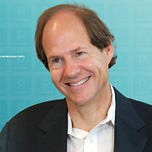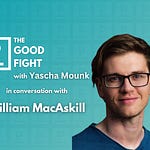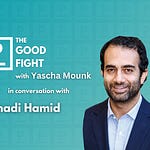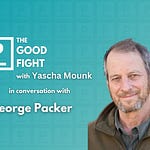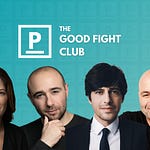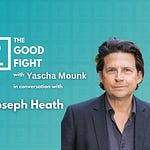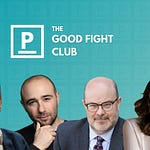Thanks for reading! The best way to make sure that you don’t miss any of these conversations is to subscribe to The Good Fight on your favorite podcast app.
If you are already a paying subscriber to this Substack or Persuasion, this will give you ad-free access to the full conversation with Cass, plus the exciting bonus episodes we have in the works! If you aren’t, you can set up the free, limited version of the feed—or, better still, support the podcast by becoming a subscriber today!
Cass Sunstein is an American legal scholar and the Robert Walmsley University Professor at Harvard University. Sunstein was the Administrator of the White House Office of Information and Regulatory Affairs under Barack Obama, and is considered to be the most widely cited legal scholar in the United States. Sunstein is the author, with Richard Thaler, of Nudge: Improving Decisions about Health, Wealth, and Happiness, The World According to Star Wars, and Campus Free Speech: A Pocket Guide.
In this week's conversation, Yascha Mounk and Cass Sunstein discuss his “law of group polarization” and how it contributes to today’s factionalism; how echo chambers work (and why social media makes them worse); and whether meeting the challenge of misinformation requires new government regulations.
The transcript and conversation have been condensed and lightly edited for clarity.
Yascha Mounk: You're an incredibly prolific author who's influenced me in many ways, but your latest book is on a subject that I'm also very interested in, which is free speech and particularly the role that free speech should play on campus.
This is obviously a timely issue. What do you think that smart people are getting wrong about that subject right now?
Cass Sunstein: Well, I think that one mistake is that people think that universities are covered by the same principles, regardless of whether they're public or private. And as a legal matter, public universities are governed by the First Amendment and private universities just aren't. There's also a lot of talk about incitement without a lot of clarity about what that particularly entails. So if I say something like, “If you don't buy my book there's going to be a revolution,” that's kind of hopelessly useless talk on the part of an author and that would not be regulable as incitement.
Mounk: Let's go through this. Clearly, public universities in the United States are public institutions and therefore bound by the First Amendment. So there's very tight limits on what they can do to regulate the speech of members of the university. Private universities in principle are not bound by the First Amendment. They can make quite restrictive rules on speech and some of them, such as religious institutions, regularly do so. Nevertheless, many have very far-reaching academic freedom because they think that this is the core purpose of their institution.
Do you think that's a good or a bad idea? Even if private institutions aren't bound by the First Amendment, should they effectively bind themselves by some equivalent to the First Amendment through the kind of internal rules they adopt?
Sunstein: That's a really great idea. So let's say Harvard or MIT or Boston University says “we're going to follow the First Amendment,” that's terrific. And that's a really good start, and it might be a really good end. I applaud those universities that have said they will voluntarily follow First Amendment principles.
I’ve spent a lot of time at the University of Chicago, which is full of economically oriented people, including economists. And I learned that when you're really stuck, there are two good things to think about: the cost of decisions and the cost of errors. When you're stuck, you want a decision that doesn't impose a nightmare on the human mind, meaning you need to reduce the cost of decisions. So if you impose high decisional burdens on yourself or an institution, that's typically not a good thing to do. It can involve paralysis, can involve exhaustion, it can involve a thousand and one terrible things. If you say we're going to follow the First Amendment, the cost of decisions goes way down. You have a framework, and it's often just an assortment of rules, and where it's not rules, it's profoundly orienting, and it prevents what Oscar Wilde said about socialism: The problem with socialism is that it would take too many evenings. And whether or not that's true of socialism, building a system of, let's say, academic freedom or appropriate principles of freedom of speech from the ground up is—that's a lot of evenings there. The second point is that the First Amendment is an admirably well-suited set of principles for at least most universities. So it's not only reducing the burden of decisions, it's reducing the number and size of mistakes. So if you adopt the First Amendment, you have some principles that are super attractive for at least the vast majority of educational institutions on reflection. You can regulate fraud. You can regulate criminal conspiracy and criminal solicitation. You can regulate direct threats. All of these are regulable under the First Amendment. But if you're discriminating on the basis of viewpoint, saying people can't speak because they have one view on, let's say, what's happening in the Middle East, that's not allowed. And that's really good for educational institutions not to discriminate against people because of their viewpoint. So costs of decisions go down. The costs of errors also go down. To build a framework that's well suited to your private university that is better than the First Amendment: good luck with that.
Now, to your point, there are reasonable arguments that go the other way, and we can build up from that by thinking about, say, the Naval Academy or West Point, which are training soldiers. Should they follow the First Amendment? The answer to that is no. Or take Notre Dame or Brandeis: institutions with a religious identity might think, well, we have a particular mission here and it's associated with our heritage. And that would justify some departures from the First Amendment, but not a lot of them. If you're a private university that's not military or religiously affiliated in some kind of culturally central way, there are some cases that will either pose the puzzle whether universities should be allowed under the First Amendment to depart from what governments can do. Sometimes the answer to that is definitely yes. But also, as they say, that way lies madness. If you press those questions too hard, you start having decisional burdens which will overwhelm the system and you start leading to conclusions that are errors, meaning you're going to be regulating speech that you really ought not to, or you're going to be confusing yourself about whether to regulate speech you really ought to regulate.
Mounk: People sometimes get wrong what the First Amendment entails for the kind of restrictions on conduct you can have on campus, whether that relates to incitement or other kinds of behaviors. In one case at the law school of Berkeley University, which involves actors who presumably should know a little bit about the law, students argued that when the university told them they can't disrupt a lecture and stop it from going ahead, that in itself constituted a restriction of their freedom of speech, their freedom to protest this lecture. So help us clear up some of these confusions.
At what point could the administration say that intimidation or incitement is crossing a legal boundary, and that, despite their belief in a very far-reaching conception of the First Amendment, they are entitled to act?
Sunstein: Let's take three initial cases. Suppose someone drives a car into a building saying that this is their way of protesting climate change: “the use of automobiles is associated with destruction, and what we're showing you is what climate change is doing because of the use of gas-powered cars.” The prohibition on driving cars into a building isn't targeting speech except incidentally. It's called an incidental restriction on free speech, charmingly, and that's not protected by the First Amendment. So let's take incidental restrictions as a category of restrictions that are typically upheld—now, there has to be a reason for them. If it's kind of gratuitous, then it wouldn't be upheld, but now you're protecting a building from destruction. Okay, suppose it said that you can't trespass on certain property, that is, people can't come here and build tents. Let's say it's an anti-trespass law or it's maintaining open spaces—that's plausibly best characterized as a content-neutral restriction on speech. That's almost certainly OK, because the protection is designed to safeguard an interest that's legitimate. People can go here to and fro. And also the restriction on speech is maintaining lots of channels by which people can let their views be known. And content-neutral restrictions, when they're upheld, always do that.
Now let's suppose someone comes to campus and says that Donald Trump was the greatest president ever, or Joe Biden has been the greatest president ever, and people shout them down on various grounds. The prohibition on shouting down, if it exists, is a content-neutral restriction, and it has legitimate goals, which is to allow speakers to speak. And so the First Amendment doesn't stand in the way of that content-neutral restriction.
Now let's talk about incitements. Suppose someone says there's a book about free speech on campus, and if you don't get that book, there's really going to be hell to pay because we're going to take over a building. The Supreme Court has said that the category of incitement for First Amendment purposes includes speech that's directed to incite and likely to incite imminent lawless action. Now, that's a mouthful, but it means there has to be an intention to incite imminent lawless action and it has to be likely to incite imminent lawless action. So if you say things like “We take over buildings now,” that's a candidate for being regulable, but you have to show it's likely to incite imminent lawless action.
Now, if you make people feel scared or humiliated, that's not a basis for regulation. If you make people feel unsafe, that's not a basis for regulation. So if someone says something like “Slavery was great” or “Hitler was right on everything,” that's not regulable. If it's part of something that's directed to incite and likely to incite lawless action then it would be, but by itself it doesn't seem like that.
Mounk: I want to pivot a little bit, but I think actually the themes I'm about to touch on connect back to free speech in an interesting way. I'm going to pose a puzzle to the audience and to you, Cass, though I suspect you know the answer.
Imagine that you have a group deliberating on what kind of damages a company should have to pay for a faulty product that resulted in harm to a child. And let's say that everybody in this group has agreed that the company should pay substantial damages before they deliberate as a group. They come up with sums between $500,000 and a million dollars.
What kind of sum are they likely to settle upon after they deliberate together?
Sunstein: Well, I would have predicted the group would end up around the median or average of group members, but the data actually shows that the group tends to go to extremes and may well end up at the most extreme point of any individual in the group and will be more extreme than the median or average member. So deliberating juries awarding punishment dollars tend to be more extreme, just meaning a higher number, than the median member before they started to talk.
Souhaitez-vous - ou quelqu'un que vous connaissez - avoir accès à tous ces articles et conversations en français ? Cliquez sur ce lien et activez “en français” sous Notifications ! 🇫🇷
Mounk: Yeah, so it might even be more than any individual wanted at the beginning. You dubbed this the law of group polarization. And why is it such an important insight about the ways that groups behave?
Sunstein: This is one of my favorite areas at the intersection of political life, democracy, and law. And it's connected with the rise of authoritarianism and extremism of multiple kinds. So group polarization means groups typically, not always, but typically end up at a more extreme point than their pre-deliberation tendencies. If you have a group of people who tend to think it's important to have guns, then after they talk to each other they'll likely conclude that it's really, really important to have guns. If you have a group of people who think that Hitler seems pretty good and we should probably elect him in Germany in the 1930s, then after they talk to each other they'll be, on average, super enthusiastic for Hitler. So the noteworthy thing is that groups typically end up going to extremes. They become more unified, more confident, and they go whoosh. And this is observed in a very large number of experiments. It's observed in the real world. And it happens all over the world.
Mounk: Now, I think that's an interesting way connected to another term that I believe you coined or at least you helped to popularize, which is that of echo chambers. On social media and the age of the internet, we have a lot of people assembling who are like-minded. And this can be broadly along partisan lines. It can also be about specific issues: If you were a vegan before and it was part of your identity, but in most of your social life you aren't around many vegans, that has a moderating influence on your views. And if, suddenly, you're in some kind of online activism board where you're just talking to other vegans, you're not only in an echo chamber, but because of the law of group polarization, you're then likely to have an ever stronger and less compromising commitment to veganism.
Do you think that the combination of these two ideas, the law of group polarization and the rise of echo chambers in our online world, helps to explain some of the rancour, some of the anger, some of partisan polarization and the dysfunction of our politics today?
Sunstein: So I was lucky enough to work in the White House for four years and at some of the, let's say, least productive meetings in the White House, you have a group of people where the average person would think, “Let's do this,” and as they spoke with one another, they would become extremely firmly committed to that and they'd become more extreme. Now, that would usually be fixed, but in any White House that's a risk. So now let's talk about politics. If you're a group of people who tend to think, let's say, that one presidential candidate is good, and the other is not so good (let's bracket the question of whether they're right), as they talk to each other, they'll hear lots of arguments in favor of the goodness of the one they prefer, and not many in the other direction. And as they talk to each other, they will become more extreme, not because there's anything weird about them, but because they're hearing arguments in support of the conclusion to which they're drawn. And that's how echo chambers work. So I like dogs very much. If I'm talking to people like me, then by the end we're going to like dogs extremely much, and if we don't like cats that much (we wish them well, but we don't like them that much), it is likely that the dog enthusiasm will skyrocket and the cat enthusiasm, let's say, will go down the tubes. And then pretty soon we have a very polarized community.
Mounk: I want to connect this back to the concern of free speech because clearly one of the things that has happened over the last years is that a bunch of people have said the public sphere really isn't doing its job. And it allows very extreme views to fester. It allows views that may just be fundamentally wrong to fester. It might allow for the spread of conspiracy theories. And that has fundamentally transformed the kind of political and social dynamic we're in. And so therefore, all of this requires us to either, putting it politely, completely reconceptualize what the First Amendment means or, to put it more bluntly, to adopt restrictions on free speech that are much more common in democracies outside of the United States.
You clearly have provided many of the analytical tools for understanding this moment, and yet I take it that you don't draw that conclusion. Make the case against that. How is it that we can sustain a healthy polity despite those challenges, and what is a better response to these problems than a curtailment of the First Amendment?
Sunstein: So this is fantastically on the money, so to speak. And it's clearly the case that the argument that the system of free speech will lead, through the marketplace of ideas, to the truth is under a lot of empirical pressure. So what do we do about that?
Okay, let's adopt three categories of response. One is to do nothing, on the ground that the cure is worse than the disease. That’s going to be just too dangerous a thing. So as terrible as things are now, any effort to solve it would make things worse. And we could spell out why that might be a plausible view. I actually don't share that view.
Let's say a second position is we need the authorities to take hold of the situation: We're a democracy after all, and democratic restrictions on a speech market which has gotten out of control is actually better than the out of control situation we're already observing—I think that is not correct, though to spell it out would take a lot of detail. Let me, in favor of rejecting the radical approach, suggest a form of free speech incrementalism, speaking now as a person who's not wedded to existing categories but is willing to rethink them. And let's just have two examples of falsehoods. Libel is broadly protected by the First Amendment—I don't think that's the right answer for now. So if someone says, negligently, something that is libelous of another person (it could be a political figure, an actor, or your neighbor), I say the idea that the First Amendment protects that isn't clearly right—to put it more bluntly, it’s wrong. And the spiraling damage awards do chill speech excessively. So if someone's asked to pay $5 million because of a libel, then we’re going to have too much self-silencing. But if someone has to pay a dollar and retract, that's okay, I think. So to rethink libel law is a really good idea.
Deep fakes—and take this as a metaphor for misinformation as well as a thing—are posing new threats to the system of free expression. And to say you label your deepfake as such, that may be legitimate, and it might be not enough. So to require certain kinds of deep fakes to be taken down might be a really good idea. I think for false statements of fact in general, we need a project of rethinking. Now there's a difference between a harmless false statement of fact, like “Tom Brady isn't the greatest quarterback of all time.” That's a false statement of fact. Tom Brady is the greatest quarterback of all time, but that's not a particularly harmful false statement. If you say that the current political leader is stupid, and let's say it's just not true. The person isn't by any measure stupid, but we need a lot of space for that. But if there's something that is knowingly false and harmful, like “cigarettes cause longevity” or “the current political leader is a cocaine addict.” Now there's a discussion to be had about whether current understandings of the First Amendment are up to the task. And I think the basic answer is no. So we need to rethink them, not to censor more, but maybe to revive long-standing understandings of the right balance to be struck, which maybe have information for us for confronting new problems.
In the rest of this conversation, Yascha and Cass discuss the intricacies of free speech law and restrictions on free speech, as it regards military academies, religious colleges, and other types of institutions. This discussion is reserved for paying members...
Listen to this episode with a 7-day free trial
Subscribe to Yascha Mounk to listen to this post and get 7 days of free access to the full post archives.


